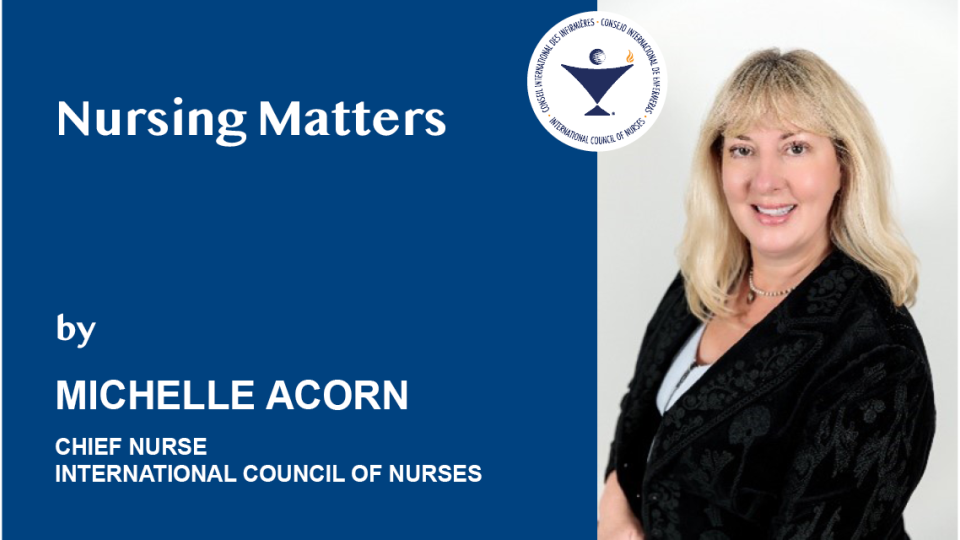Chief Nurse Blog: Nursing Matters April 2022

This month’s blog will focus on clinical practice to advance evolving competencies following a recent meeting with the Global Genomics Nursing Alliance (G2NA). Understanding genomic competencies is timely!
DNA directs the essential functions of most living things, and each organism’s DNA is unique. Genome refers to an organism's complete set of DNA that is present in every cell in the body. Almost 70 years after the discovery of the double helix, our understanding of how DNA affects health and wellbeing has grown exponentially and we are living in the “genomic era”. Just earlier this month, scientists announced they had finally fully mapped the human genome sequence! For DNA Day, 25 April, we present: 10 reasons why genomics matter to nursing.
1. Genomics is a “lifespan competency”
Genomics is relevant across the lifespan, i.e. preconception and prenatal testing, newborn screening, to identify disease susceptibility, for screening and diagnosis, to determine prognosis and guide therapeutic decisions, and for monitoring disease burden and recurrence. Genomics is important for nurses in all areas of practice and at all levels of preparation.
2. Nurses are the most numerous and trusted healthcare professionals worldwide
Nurses can use their trusted role to advocate for patients/families/communities, assist people in navigating complex healthcare ecosystems, and promote self-management. Many people lack basic genetic literacy and numeracy skills to understand test results and use the information to make high quality decisions (i.e. informed and aligned with patient values and preferences) about care and management.
3. Genomics has moved from specialist clinics to mainstream care (e.g. primary care)
Increasing genomic knowledge and falling costs of genetic testing have shifted genomics from specialty clinics to mainstream healthcare across specialties and primary care. People are at risk for cancer and cardiovascular disease, hereditary Breast and Ovarian Cancer, familial hypercholesterolemia or other conditions in which evidence-based guidelines and recommendations support genetics because of significant potential for positive public health impact (i.e. enhanced monitoring/treatment to improve health outcomes). Regardless of specialty or area of practice, nurses can improve health outcomes by being aware of and identifying at-risk patients/families and referring people for genetic services.
4. Pharmacogenomics has important implications for improving outcomes and avoiding adverse effects
Pharmacogenomics examines how an individual’s genes affect their response to medications (i.e. drug metabolism) and can help nurses identify ‘slow’, ‘normal’ and ‘super’ metabolisers. Currently, there are guidelines for over 160 medications that directly affect clinical care, which can be used to individualise care and guide the “4-Rs” (right drug for the right patient at the right dose at the right time) and can help improve health outcomes and avoid adverse drug reactions.
5. There are about 7,000 rare diseases, nearly all of them are genetic in etiology
Approximately 1 in 10 people globally are affected. Understanding genetics can help nurses shorten the “diagnostic odyssey” of patients living with rare diseases, provide counselling and support.
6. The public is increasingly using direct-to-consumer (DTC) genetic testing
The public is increasingly using DTC genetic testing from companies like 23andme and Ancestry. The lay public often lacks understanding of test results. Nurses are experts in person-centred communication, therapeutic education and can play an important role in post-testing support.
7. Important aspects of advocacy and equity have emerged in the “genomic era”
Genetic tests are interpreted using reference data from large datasets to determine the risk associated with a particular change. Issues of diversity and equity must be addressed to ensure that genomic discovery benefits all. Nurses can communicate and engage with individuals from traditionally disadvantaged/marginalised groups who may have faced discrimination and experienced negative healthcare encounters in the past.
8. Genomics has critical ethical, legal and social implications for nursing
Rapid technologic advances and genomic discovery have deepened our understanding of the molecular basis of health and illness. Some of the wide-ranging concerns include fairness in the use of genetic information, concerns about privacy and confidentiality, the impact of genetic information on individuals (e.g. identity, origin, insurance coverage, how genetic information affects reproductive decision-making). The ICN Code of Ethics for Nurses reveals that, “Nurses ensure that the use of technology and scientific advances are compatible with the safety, dignity, and right of people which can include these aspects of genomics”.
9. Genomics offers new avenues for empowering patients to improve their health and achieve greater wellbeing
Learning patient’s genetic susceptibility and risk presents new opportunities to engage patients in health promotion discussions (i.e. lifestyle modification, behaviour change) to mitigate disease risk. Incorporating genomics into health promoting discussions provides new levers to coach patients, families and communities for healthier behaviours.
10. Nurses play a central role in working with patients, families and communities to harness the full potential of genomics
The COVID-19 pandemic has highlighted the relevance of genomics. Reports of SARS-CoV-2 variants, genetic tests for COVID-19, and genetic testing for surveillance of wastewater supplies have spurred the global public to consider genomics in the context of public health. Nurses play a crucial and pivotal role in helping patients understand their genetic test results and eliciting patient values and preferences about how to best use the information to make high-quality decisions about their health. Similarly, nurses can leverage their expert communication skills to help patients gain confidence and self-efficacy for having discussions with at-risk blood. The Canadian Nursing and Genomics steering group produced a series of short videos to support nurses to support individuals and families through genomics informed care.
Canadian Nursing and Genomics: Whiteboard Video 1 - YouTube
Impact of genomics in healthcare and why genomic literacy is necessary for nurses.
Canadian Nursing and Genomics: Whiteboard Video 2 - YouTube
Engagement and priorities for action to integrate genomics into nursing practice.
Canadian Nursing and Genomics Whiteboard Video 3 - YouTube
Nursing intraprofessional collaboration for the benefit of individuals and families.
Canadian Nursing and Genomics Whiteboard Video 4 - YouTube
How nurses with genomic literacy can address the social, equity and ethical issues.
Educationally yours, Michelle
Dr. Michelle Acorn, DNP NP PHC/Adult, CGNC, FCAN, FAAN